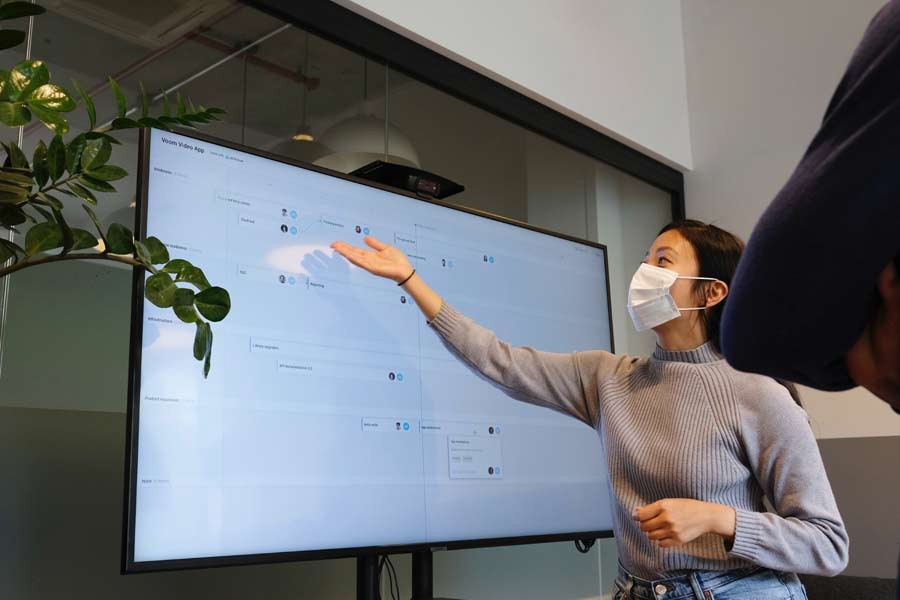The coronavirus (Covid-19) pandemic has affected the working lives of just about everyone, but early evidence shows it has hit women the hardest. There is opportunity in the mix of measures forced upon companies and workers, however, and some could help advance the role of women once current restrictions are lifted.
The pandemic can't be allowed to set back the progress made thus far. Instead, changes such as more flexible working hours and work-from-home need to be examples carried over to increase the pace of improvements.
Getting more women into the paid workforce and making it a more equitable place once they are there has long been both a social and economic goal worth pursuing for Asia. But this goal remains unfulfilled.
In developing countries in Asia, the labor force participation rate of women is 50.0 per cent compared to 82.0 per cent for men. Women continue to do most of the domestic and unpaid care work, and they also have too few decision-making roles in government and business.
Getting more women into the paid workforce makes economic sense, leads to diversity of thinking in the workplace, and improves the bottom line. Evidence abounds on how advancing gender equality will lead to greater economic growth.
In Asia and Pacific, per capita income would rise by 30.6 per cent after one generation, and 71.1 per cent after two, by cutting down on time wasted for women and girls, promoting education and training, and increasing women's labor market participation, according to a 2016 ADB study.
Gender equality and women's empowerment are essential for meeting Asia's ambitions for inclusive growth and achievement of the Sustainable Development Goals (SDGs). Gender equality needs to be pursued not only for a just and equal society, but also for inclusive growth and faster poverty reduction.
Schools and daycares are closed in many countries, while workers have been sent home to work remotely. That has left many women doing double duty--bearing the brunt of childcare and education while trying to do their regular jobs as well.
In many households it is the women who have taken on the brunt of the extra work.
Flexible work arrangements such as those now in place in much of the world have long been a sought-after measure by those promoting greater gender equality. According to a study for the U.S. National Bureau of Economic Research( NBER), companies are likely to agree to more flexible work conditions even when the pandemic restrictions are lifted.
At the same time, in households where women are in "essential" positions such as nurses or grocery store workers, many men have inevitably turned into the main providers of childcare. And when men are forced into those roles, the share of responsibilities they take on tends to stick, noted the report, "The Impact of COVID-19 on Gender Equality."
Still, in many households it is the women who have taken on the brunt of the extra work.
That's why it is so important that efforts to improve the workforce as a place where women can thrive need to be redoubled once conditions return to a more normal state of play.
Bank jobs are a good place to start. They are among the most sought-after positions in developing countries in Asia. Generally, the workforce employed at local banks are the educated and elite in society. Progress in gender issues in banking can serve as an example for other sectors to follow and improve the banks themselves in the process.
Twenty banks from nine countries are working with ADB's Trade Finance Program on this issue. This has included establishing for the first time the extent to which human resources policies and gender strategies at banks in developing countries in Asia contribute to gender equality.
In general, banks in developing Asia have taken on the idea that improving the role of women will help their operations. They express interest in enhancing gender equality and leveraging the talents of women to drive growth.
But across Asia the level of effort being put into these goals varies widely, as it does throughout society.
Financial markets and banking are still in an early growth period in many developing countries in Asia. That means there is an opportunity to introduce best practices in gender equity-introducing statistical analysis of pay and representation of women in the workforce for example-before operating methods are entrenched.
Developing countries in Asia could in this way find themselves with a leg up on western banking, where this sort of statistical analysis is also quite patchy.
Governments could play more of a role, in the banking industry as well as the rest of society. Banks in the developing world are among the most responsible companies when it comes to strictly following local labour laws. But if those laws don't reflect gender equity goals, it will be more of a task to get the job done.
Updating laws would be a good start. But companies in the financial industry also need to look inward to analyse their own human resources policies and craft plans to improve gender balances (both pay and staff representation). Help is available, from ADB and elsewhere.
As we found when we started our work with banks on these issues, officials are interested and eager to make advances.
The pandemic and its longer-term effects on how we work and live could either boost or dent what progress we've made on gender equality. Now is a good time to build on the advances made over the past few years.
Steven Beck is Head of Trade Finance, Asian Development Bank (ADB)
[Source: https://blogs.adb.org]


